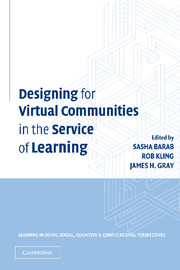Book contents
- Frontmatter
- Contents
- List of Contributors
- Series Foreword
- Foreword
- Preface and Acknowledgments
- In Memoriam
- PART I COMING TO TERMS WITH COMMUNITY
- PART II DESIGNING FOR WEB-SUPPORTED COMMUNITY
- PART III FOSTERING COMMUNITY/MEMBER PARTICIPATION
- PART IV RESEARCHING ONLINE COMMUNITY
- 11 Scholarly Networks as Learning Communities
- 12 Computer-Mediated Discourse Analysis
- 13 Shared “We” and Shared “They” Indicators of Group Identity in Online Teacher Professional Development
- 14 Sociocultural Analysis of Online Professional Development
- Index
- Titles in the series
- References
13 - Shared “We” and Shared “They” Indicators of Group Identity in Online Teacher Professional Development
Published online by Cambridge University Press: 05 June 2012
- Frontmatter
- Contents
- List of Contributors
- Series Foreword
- Foreword
- Preface and Acknowledgments
- In Memoriam
- PART I COMING TO TERMS WITH COMMUNITY
- PART II DESIGNING FOR WEB-SUPPORTED COMMUNITY
- PART III FOSTERING COMMUNITY/MEMBER PARTICIPATION
- PART IV RESEARCHING ONLINE COMMUNITY
- 11 Scholarly Networks as Learning Communities
- 12 Computer-Mediated Discourse Analysis
- 13 Shared “We” and Shared “They” Indicators of Group Identity in Online Teacher Professional Development
- 14 Sociocultural Analysis of Online Professional Development
- Index
- Titles in the series
- References
Summary
Currently, many educators are adopting community of practice theory (CoP) as a framework for designing environments to support learning (Lave & Wenger, 1991; Wenger, 1998). An assumption underlying community of practice theory is that learning occurs not only as a cognitive change in the learner but also as a social trajectory within a group. The social identities of learners change as the learners become recognized as experts within a social group that shares a set of practices. Wenger uses the example of insurance claims processors to illustrate how communities of practice work. The actual practice of claims processors is as much a product of the informal social networks and war stories of experienced members as it is a product of the formal procedures mandated by the company.
Not surprisingly, CoP as a descriptive theory has been applied as a design framework for online learning in addition to an analysis framework for examining workplaces bounded by a common location (Johnson, 2001; Schwen & Hara, this volume). The hope is to combine the information sharing and shared enterprises that characterize physical CoPs, along with characteristics of longstanding communities that have emerged on the Internet. Although the definitions of Internet community differ, most of the work on online communities makes a distinction between groups of people forming cohesive social structures in an online space and groups of people who just happen to use an online space (Barab, 2003).
Information
- Type
- Chapter
- Information
- Designing for Virtual Communities in the Service of Learning , pp. 377 - 403Publisher: Cambridge University PressPrint publication year: 2004
References
Accessibility standard: Unknown
Why this information is here
This section outlines the accessibility features of this content - including support for screen readers, full keyboard navigation and high-contrast display options. This may not be relevant for you.Accessibility Information
- 7
- Cited by
